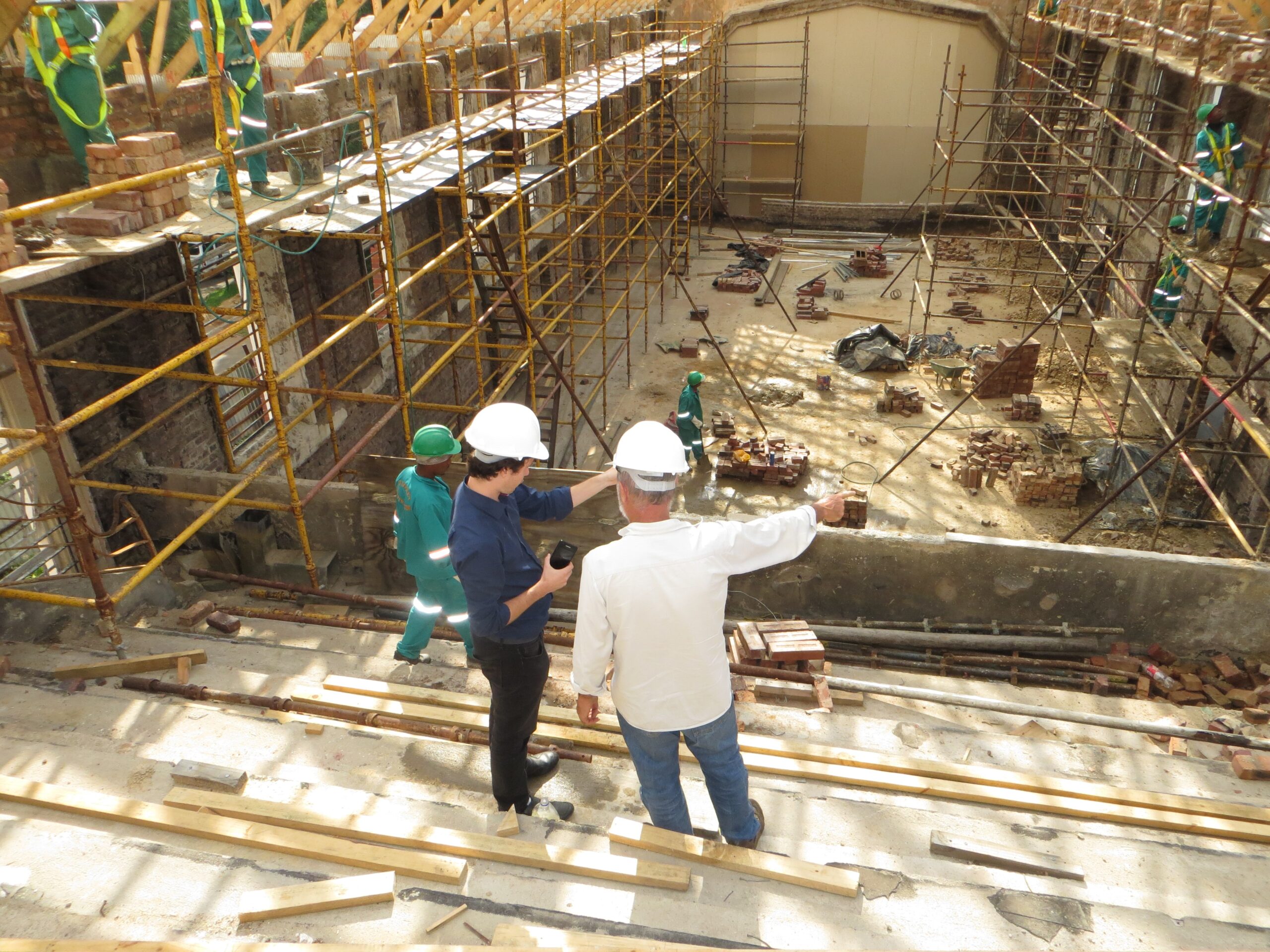The construction group at U of T leads an educational and research agenda for the development, construction, and operation phases of projects in smart cities. Our work contributes new knowledge to advance industry practice and public policy in the domains of project management, construction engineering, and asset management. This spans three main spheres:
-
Smart systems:
the optimal deployment of robotics, computer vision and IoT (Internet of Things) for safe, efficient, and sustainable on- and off-site construction tasks. We are engaged in the design of robots that can automate work tasks. We are investigating the use of advanced sensors, IoT and drones to support the generation of reliable data; assessment of productivity and work progress; real-time monitoring of workforce safety.
-
Advanced software:
data models and semantic representations of construction and asset management knowledge. We investigate how to make BIM (Building Information Models) support context-aware collaborative work and knowledge exchange. We use artificial intelligence to automate the detection of people and equipment and to remotely control smart machinery. We use machine learning to study data quality, detect patterns, and develop insights from structured and unstructured data. We deploy these insights to support business intelligence applications in project management and decision-making during the construction and operation phases of facilities.
-
Citizen scientists:
we do the above in a manner that does not only aim to consider community needs or even just engage communities in decision-making but, instead, to empower communities to co-create (with professionals) sustainable designs and work plans. The construction site becomes a space for human-machine collaboration. The built asset becomes a platform for knowledge-savvy workforce and citizens to innovate new solutions.
| Name | Job Title & Duties | Contact Details | |
|---|---|---|---|
 | El-Diraby, Tamer | Professor
| Office: GB 329 (416) 978-8653 tamer.diraby@utoronto.ca |
| Kim, Daeho | Assistant Professor | Office: SF 3001C (416) 946-3505 civdaeho.kim@utoronto.ca |

Construction accounts for a significant fraction of the Canadian GNP. However, very little industry-driven research is being undertaken relative to other industries. The opportunities for learning and growing in this industry are enormous. Students undertaking courses or research in the field of construction management investigate, research, model and develop methods for improving engineering and management processes in the construction industry. Topics include - but are not limited to infrastructure management, performance diagnostics, intelligent systems and computer applications. In addition, the investigation of attitudes toward site safety and pre-qualification of contractors is considered.
Construction & asset management courses
The group teaches both undergraduate and graduate courses. Our courses cover topics related to project management from the perspective of contractors, owners, consulting engineers and architects and the community at large. In addition to construction project management, the courses cover also the practice of asset management. The courses cover the fundamentals of these two domains as well as advances in technology and business administration. The courses explore these topics at the project level, the company level and the industry level.
- Civ280–Management of Construction: this is a mandatory course for all civil engineering students. It covers the basics of construction project management, including project delivery systems, construction contracts and procurement methods, quantity take-off and cost estimation, project scheduling methods (e.g., critical path method and linear scheduling), and earned value method.
- Civ420–Construction Engineering: this is an elective course that focuses on advanced topics in construction engineering. The course covers productivity analysis (for heavy civil equipment); introduction to Building Information Modeling (BIM); project cashflows and financial management; and value engineering.
- Civ580–Engineering and Management of Large Projects: the course covers the wider context of large projects. The course considers means to handle the complexity of project initiation and the approvals and management of large urban projects. Topics covered include pre-project planning, managing the design of large projects, permitting and commissioning, and community engagement. A set of industry experts actively participate in the delivery of this course.
- Civ1299–Construction Workforce & Safety and Ergonomics: this course focuses on site-level practices, particularly the interaction of new technologies and crew safety. The course teaches students about the role of the construction workers in the safe and smart operations of sites, including (i) smart site systems, (ii) safety, health, and ergonomics issues, (iii) worker compensation insurance, and (iv) methods for safety and health monitoring and reporting. Advanced topics related to human-robot collaboration in future construction is also covered.
- Civ1299–Computer Vision and Construction Automation & Digitization: the course covers the basics of computer vision and deep neural networks and their potential applications in construction automation and digitization. Topics include (i) hardware set-up for computer vision applications (e.g., imaging sensors, drones, agile mobile robot platforms), (ii) basics of computer vision and deep neural networks, (iii) visual AI tasks (e.g., object detection, semantic segmentation, pose estimation, 3D reconstruction), and (iv) construction applications (e.g., progress monitoring, safety monitoring, digital twinning, etc.)
- Civ1285–BIM (Building Information Modeling): This is an introduction to BIM. it introduces the topic at the project level: how to use BIM to enhance the management of projects. It covers the development of 4D and 5D models for the management of construction projects, particularly coordinating the development and control of schedules and budgets.
- Civ1299–Virtualization and analytics in construction: while Civ1285 addresses the project-level application of BIM, this course covers advanced topics in BIM at a company level. How to build a company-wide information management system. It also covers the development and use of digital twins to virtualize construction processes and evaluate decision options. Topics include data modeling (mainly IFC and ontologies), linked data systems, common data environments, and the management and use of analytics in construction systems. No new algorithms or coding is taught, rather, how analytics and smart systems can be used to advance project management at a company level.
- Civ1289–Business of Knowledge in Civil Engineering: this course takes the use of advanced informatics to the industry-level practices: how to use and advance the applications of industry 4.0 systems in the industries; and the role of civil engineers in advancing smart city systems. Topics include business modeling, civil informatics systems, industry 4.0 and process digitization, and knowledge management.
- Civ1281–Asset Management: Frameworks and Processes: an introduction to asset management. The topics include road-mapping asset management systems, developing and managing asset levels of services, deterioration assessment and prediction, risk analysis, rehabilitation technology, and policy making.
- Civ1283–Asset Management: Quantitative Tools and Methods: the use of operations research and optimization techniques in asset management decision making.
- Civ1279–Construction Contract Documents: the course covers the fundamentals of project legal issues and contracting documentation.
- Civ1299–Introduction to Construction Claims: advanced approaches for alternative claim resolutions.
Construction specialization (for MEng. students)
MEng students who want to specialize in construction project management have to take at least six construction-related courses as follows: :
Select at least 4 of the following courses
- Civ580–Engineering and Management of Large Projects
- Civ1299–Construction workforce & safety and ergonomics (may not be offered annually)
- Civ1299–Computer Vision and construction automation & digitization (may not be offered annually)
- Civ1285–BIM (Building Information Modeling)
- Civ1299–Virtualization and analytics in construction
- Civ1289–The business of knowledge in civil engineering
- Civ1281–Asset management I: frameworks and processes
- Civ1283–Asset Management II: quantitative tools and methods
- Civ1279–Construction contract documents
- Civ1299–Introduction to construction claims
Selected Theses and Projects
- Azad, Roya, M.A.Sc. (2000): “A belief network for prediction of extra cash withdrawals for Y2K”
- Ehramikar, Soheila (2000): "The Enhancement of Credit Card Fraud Detection Systems Using Machine Learning Methodology"
- Eyers, Kevin, M.A.Sc. (2001): “Belief network analysis of direct cost risk in building construction”
- Gong, Xiaodong, M.Eng. (1999): “Contractor prequalification process”
- Khan, Muhammad Fayaz, M.Eng. (1999): “Development of cost estimation model for light industrial buildings”
- McIntosh, Karl, MASc (2002): "The risks and benefits associated with international construction / consulting joint ventures formed in the English-speaking Caribbean"
- Nasir, Daud, M. A. SC. (2000): "Probabilistic Analysis of Schedule Risks for Building Construction"
- Njardardottir, Hrodny, M.Eng. (1999): “Concrete bridge deck deterioration diagnostic tool using belief networks”
- Pershad, Rinku (2000): "A Bayesian Belief Network for Corporate Credit Risk Assessment"
- Pilateris, Peter, M.A.Sc. (2000) : “The evaluation of contractors based on financial data using data envelopment analysis”
- Raimondi, Giovanni, M.Eng. (1999): “Concrete pavement diagnosis and report and the utilization of a belief network diagnostic program”
- Ramani, Joseph, MASc. (2000): “Reducing the bias in contractor prequalification using data envelopment analysis”
- Serrano Jurado, Claudia, M.Eng. (1999): “Remote site construction in cold climates: conventional vs. modular methods”
- Tian, Qin, MASc. (2002): “CMSS: an interactive construction management simulation system”
- Tran, Viet H Q, MASc. (2002): “Practical Frontier in Construction Prequalification”
- Karahalios, Jim, MASc. (2005): “An Investigation of Attitudes Towards Safety in the Ontario Construction Industry”